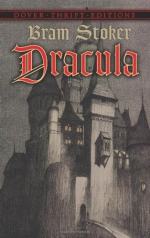“Right, my friend,” he said. “Quite right! Better he not know as yet. Perhaps he will never know. I pray so, but if it be needed, then he shall know all. And, my good friend John, let me caution you. You deal with the madmen. All men are mad in some way or the other, and inasmuch as you deal discreetly with your madmen, so deal with God’s madmen too, the rest of the world. You tell not your madmen what you do nor why you do it. You tell them not what you think. So you shall keep knowledge in its place, where it may rest, where it may gather its kind around it and breed. You and I shall keep as yet what we know here, and here.” He touched me on the heart and on the forehead, and then touched himself the same way. “I have for myself thoughts at the present. Later I shall unfold to you.”
“Why not now?” I asked. “It may do some good. We may arrive at some decision.” He looked at me and said, “My friend John, when the corn is grown, even before it has ripened, while the milk of its mother earth is in him, and the sunshine has not yet begun to paint him with his gold, the husbandman he pull the ear and rub him between his rough hands, and blow away the green chaff, and say to you, ’Look! He’s good corn, he will make a good crop when the time comes.’”
I did not see the application and told him so. For reply he reached over and took my ear in his hand and pulled it playfully, as he used long ago to do at lectures, and said, “The good husbandman tell you so then because he knows, but not till then. But you do not find the good husbandman dig up his planted corn to see if he grow. That is for the children who play at husbandry, and not for those who take it as of the work of their life. See you now, friend John? I have sown my corn, and Nature has her work to do in making it sprout, if he sprout at all, there’s some promise, and I wait till the ear begins to swell.” He broke off, for he evidently saw that I understood. Then he went on gravely, “You were always a careful student, and your case book was ever more full than the rest. And I trust that good habit have not fail. Remember, my friend, that knowledge is stronger than memory, and we should not trust the weaker. Even if you have not kept the good practice, let me tell you that this case of our dear miss is one that may be, mind, I say may be, of such interest to us and others that all the rest may not make him kick the beam, as your people say. Take then good note of it. Nothing is too small. I counsel you, put down in record even your doubts and surmises. Hereafter it may be of interest to you to see how true you guess. We learn from failure, not from success!”
When I described Lucy’s symptoms, the same as before, but infinitely more marked, he looked very grave, but said nothing. He took with him a bag in which were many instruments and drugs, “the ghastly paraphernalia of our beneficial trade,” as he once called, in one of his lectures, the equipment of a professor of the healing craft.




